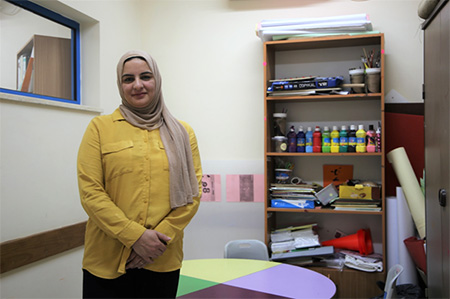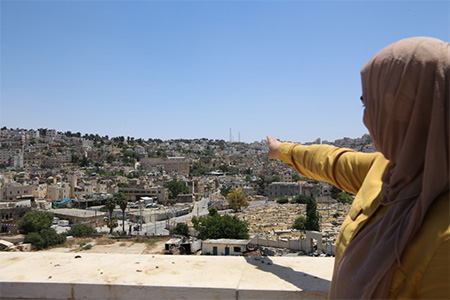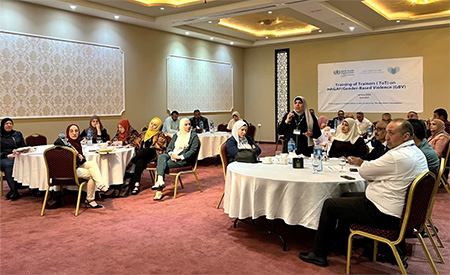 Aseel stands at the door of her office to welcome patients as they walk in. The entrance to her office is a colorful display of paints and art supplies, which she often uses to put her younger patients at ease.7 September 2022 - Aseel stands at the door with a warm and reassuring smile as patients nervously enter her office. “Anyone who’s coming to see me is not in a happy place. It’s my job to find out what is distressing them and provide support in overcoming any mental health challenges they might be facing because of their situation or life experiences,” says Aseel.
Aseel stands at the door of her office to welcome patients as they walk in. The entrance to her office is a colorful display of paints and art supplies, which she often uses to put her younger patients at ease.7 September 2022 - Aseel stands at the door with a warm and reassuring smile as patients nervously enter her office. “Anyone who’s coming to see me is not in a happy place. It’s my job to find out what is distressing them and provide support in overcoming any mental health challenges they might be facing because of their situation or life experiences,” says Aseel.
Aseel is a psychosocial counselor at the UNRWA Hebron Health Centre, providing mental health services to Palestinians living in Hebron city in the southern West Bank. The health centre covers the H2 area, which has witnessed multiple cycles of violence due to settlement activities. Many of Aseel’s patients suffer from psychological distress and mental health issues caused by the conflict and living in a constantly tense environment.
 Aseel points towards the H2 area, which has seen multiple cycles of violence due to settlement activities. Residents of the H2 area often suffer from mental health issues caused by conflict and difficult life conditions. COVID-19 has further exacerbated the situation and contributed to an increase in gender-based violence (GBV), which has enhanced the vulnerability of women and girls, Aseel explains.
Aseel points towards the H2 area, which has seen multiple cycles of violence due to settlement activities. Residents of the H2 area often suffer from mental health issues caused by conflict and difficult life conditions. COVID-19 has further exacerbated the situation and contributed to an increase in gender-based violence (GBV), which has enhanced the vulnerability of women and girls, Aseel explains.
In the last two years, Aseel has received an increased number of female patients who have developed acute stress and mental health issues as a direct consequence of experiencing violence and abuse at home. “It’s appalling and heart-breaking that women are bearing the brunt of the rising uncertainty that many families are facing due to COVID-19,” Aseel laments.
Flipping through her files, she recounts a recent case.
Salma , a young mother of two, was being verbally and physically abused by her husband after he lost his job during the peak of the COVID-19 pandemic.
She was an easy target for him. He took all his anger out on her. So much so that she started to believe that she was the cause of all his problems and would take her frustration out by beating her children. She developed severe anxiety and her mental health was spiraling,” Aseel recounts.
Salma, who lived close to the clinic eventually turned to Aseel for help. “We had four sessions, each better than the last,” Aseel explains.
“I supported her in developing mechanisms for getting her mental health under control and understanding that she is not alone. Her mindset gradually started to improve. Luckily, her husband also realized the impact his actions were having on her and that drastically changed the situation for the better.”
Unfortunately, meeting GBV survivors experiencing similar situations has become all too familiar for Aseel. But she explains that not all cases are as straightforward or have as quick a resolution as Salma’s. Some patients don’t feel confident or are trapped in circumstances where it’s extremely hard for them to reach out for support.
Women’s mental health issues can sometimes be an indicator of the GBV they are experiencing.
Often GBV survivors seeking health care at clinics are unable to be upfront about their situation due to fear and stigma. At times they don’t even recognize that they are developing mental health issues because of what they might be going through, she says.
 WHO, with support from the Big Heart Foundation, organized training to support the integration of the response to GBV into mental health and primary health care services.In the absence of adequate training, GBV and mental health cases can go undetected by primary health workers who are often the main point of contact at health facilities. Recent training provided by WHO, with support from The Big Heart Foundation, aims to address this gap.
WHO, with support from the Big Heart Foundation, organized training to support the integration of the response to GBV into mental health and primary health care services.In the absence of adequate training, GBV and mental health cases can go undetected by primary health workers who are often the main point of contact at health facilities. Recent training provided by WHO, with support from The Big Heart Foundation, aims to address this gap.
Aseel was one of 50 mental health professionals, doctors and nurses trained on the Mental Health Gap Action Programme (mhGAP) Intervention Guide (2.0), with a specific focus on screening and detecting GBV and responding to its mental health consequences.
The Guide is a crucial tool in the package of support provided by WHO since 2010 to strengthen mental health services across the occupied Palestinian territory. It is helping to expand mental health services and make them more accessible through training health workers in non-specialized health care settings and mental health professionals based at critical locations in the West Bank and Gaza. The approach aims to bridge the shortage of mental health services by ensuring that people don’t need to rely solely on specialists to access the services they need.
“The latest training of trainers, supported by The Big Heart Foundation, takes our work a step further. It aims to integrate the response to GBV in mental health and primary health care services so that GBV survivors can be screened, provided mental health support by health workers trained on the mhGAP Intervention Guide and, if needed, referred to protection and specialized rehabilitation services,” says Rajiah Abu Sway, WHO Mental Health Officer in the occupied Palestinian territory.
Plans to “cascade” the training to make it accessible to more health workers are being developed by WHO, in collaboration with the Ministry of Health.
“I’m looking forward to sharing my learning with others in my health centre. I don’t want anyone to suffer or feel that they have no one to turn to. I want to keep their hope of a better future alive,” Aseel says.
It is my duty as a health worker to ensure that I go above and beyond to help my patients, especially in Hebron, where people have already suffered a lot.




